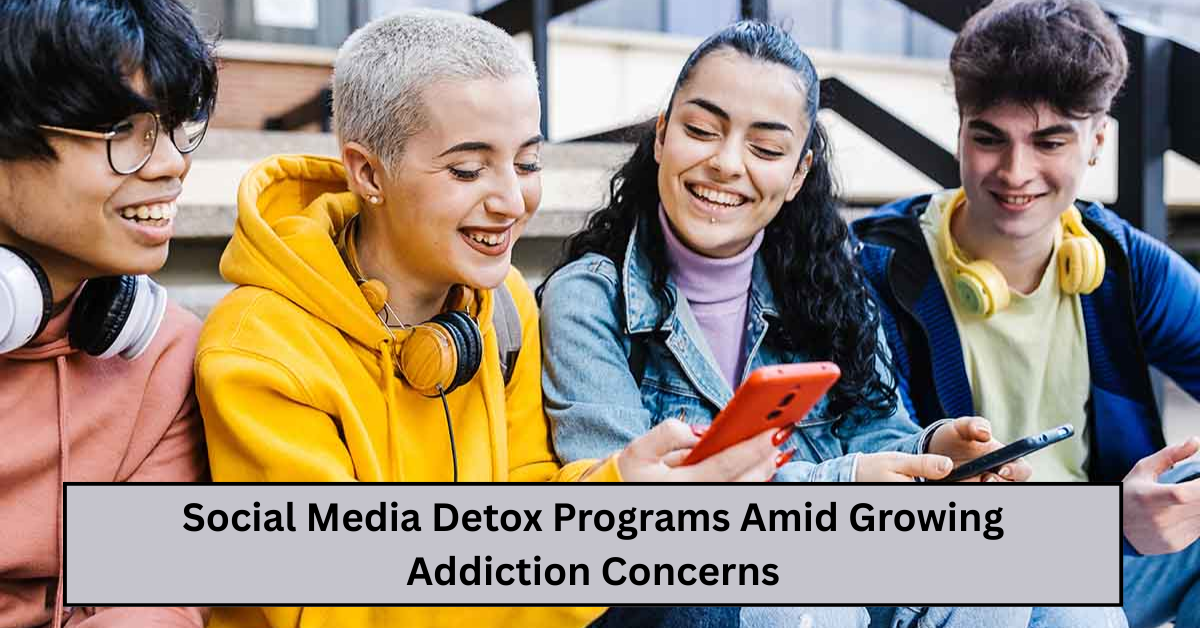Social media has become an essential part of teenagers’ lives, providing a way to connect, share, and explore the world. However, this digital world also brings challenges, especially around addictive usage patterns. Recent studies reveal that many teens are struggling to manage their social media time and are now seeking help through detox programs.
As social media addiction grows, more young people are recognizing the need to take breaks and reset their habits. This rising trend of social media detox programs aims to improve mental health and promote healthier relationships with technology. Let’s explore why these programs are gaining popularity and what teens can learn from them.
The Rise of Social Media Addiction Among Teens
In today’s digital age, social media platforms like Instagram, TikTok, and WhatsApp have become central to teen life. While these platforms offer opportunities for creativity and connection, they can also create addictive behaviors. Many teens report feeling unable to control their usage, leading to anxiety, poor sleep, and decreased focus on studies.
The constant need to check notifications and keep up with online trends can take a toll on mental health. This growing concern has led researchers to study how teenagers use social media and the effects on their daily lives. The results point to a real need for balance and better self-control.
What Are Social Media Detox Programs?
Social media detox programs are designed to help individuals take a break from their online platforms. These programs encourage reducing or completely stopping the use of social media for a specific time. The goal is to help teens disconnect, reflect, and regain control of their time and attention.
Detox programs can vary widely. Some involve setting strict phone-free hours each day, while others might use digital tools to limit app usage. Many programs also include tips for managing cravings to check social media and methods to find alternative activities that do not involve screens.
Why Teens Are Embracing These Programs
Teens are drawn to social media detox programs because they often notice the negative impacts of excessive use themselves. Feelings of stress, loneliness, and distraction have pushed many young users to look for healthier habits. Detox programs offer a structured way to break the cycle of addiction and start fresh.
Moreover, parents and schools have begun encouraging these detox practices to support mental well-being. As awareness grows about the importance of digital balance, more teens feel safe and motivated to try these programs. Success stories of improved focus, mood, and social interactions also help spread interest.
Benefits of Social Media Detox for Young Users
A social media detox can bring several positive changes. First, it reduces screen time, which can improve sleep quality and reduce eye strain. Teens often find they have more time for hobbies, studies, and face-to-face conversations, leading to better overall well-being.
Mental health benefits are significant as well. Taking a break from constant online validation helps build self-esteem and reduces anxiety. It also allows teens to be more present in the moment and build deeper, more meaningful relationships.
Practical Tips for Starting a Social Media Detox
If a teen decides to try a social media detox, it’s helpful to start with small, achievable goals. For example, setting certain hours without social media or removing apps from the phone temporarily. This gradual approach can make the detox feel less overwhelming.
Additionally, finding new activities such as reading, exercising, or spending time outdoors can keep the mind busy and reduce urges to check social platforms. Teens should also communicate with friends and family about their plans to get support during the detox period.
How Parents and Schools Can Support Social Media Health
Parents and educators play a key role in helping teens develop healthy social media habits. They can encourage open discussions about the benefits and risks of social media use. Setting clear boundaries and offering alternatives for entertainment can reduce dependence on digital platforms.
Schools can also introduce digital wellness programs and teach students about managing technology smartly. Providing access to social media detox resources and promoting offline activities helps teens feel empowered to make positive choices.
Looking Ahead: The Future of Digital Well-Being for Teens
As technology continues to evolve, teens will face new challenges around maintaining balance in their online lives. Social media detox programs are becoming an important tool to help young users build resilience and better digital habits. With growing awareness, these programs are likely to be integrated more into everyday life.
Encouraging responsible and mindful use of social media from a young age can make a big difference in mental health outcomes. For teens in India and around the world, learning to take breaks and focus on real-world connections will be a valuable skill for years to come.




